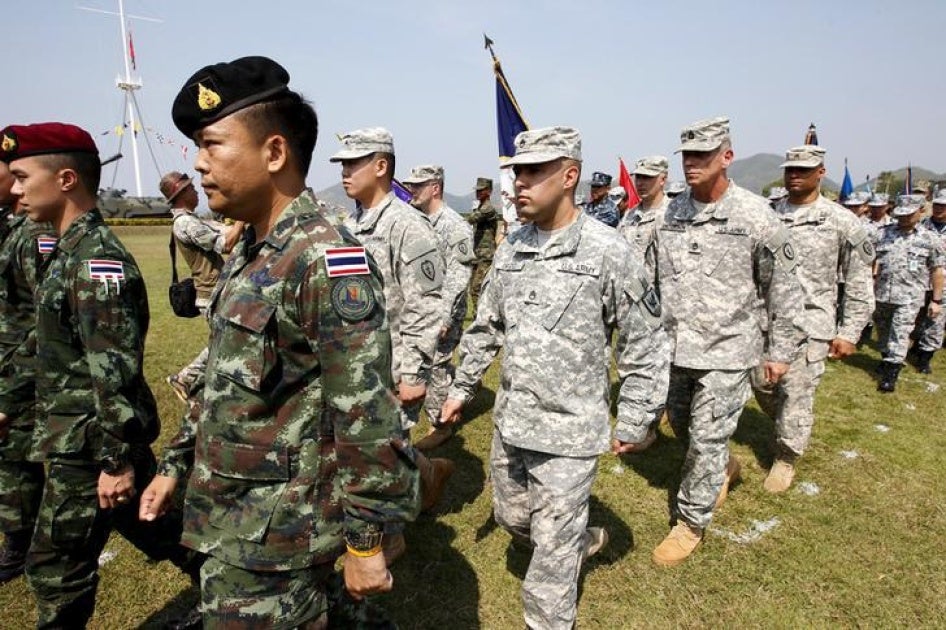A subtle but worrisome shift is taking place in US relations toward Thailand, made manifest in this year’s multilateral US-led Cobra Gold military exercises — one of the largest in the region — which begin in Thailand this week.
US-Thai relations have been severely strained since the May 2014 coup in which Thai generals overthrew the civilian government. The National Council for Peace and Order (NCPO) junta, led by Gen. Prayut Chan-ocha, now its unelected prime minister, has kept its grip on power, replacing martial law with a constitution that gives it almost limitless and unaccountable power. Repeated promises to hold elections and return the country to civilian rule have been broken, and there are no signs that the junta plans to relinquish power anytime soon.
Since the coup, more than 1,000 politicians, activists and political opponents have been arrested, and many others have been picked up for “attitude adjustment” — as the military calls it — in military camps. The military has taken over law enforcement, prosecuting numerous critics of the junta in military courts. There have been frequent and credible allegations of torture — the State Department itself has reported on the abuses. Much of the Thai media has been muzzled by soldiers intervening in newsrooms, prompting self-censorship, and state media outlets have become virtual military mouthpieces.
In 2014, the US government reacted strongly to the coup. The State Department called it what it was — something the United States failed to do after Egypt’s 2013 coup — and has kept saying it since. “Can you say it?” a journalist asked during one State Department briefing, to which spokeswoman Jen Psaki said, “Sure, we can. Coup, coup, coup.”
Given the long and close relationship between Thailand and the United States, this was not a decision taken lightly. The coup was Thailand’s second in eight years, and both were aimed against a towering political figure, Thaksin Shinawatra, and his family (his sister was prime minister during the 2014 coup), whose newer and expansive rural political base was viewed as increasingly threatening both the military and Thailand’s conservative elites. Calling it a coup has major implications in US law: The federal “coup clause” requires cuts to direct foreign assistance to any country in which a government is deposed by coup until democratic, civilian rule is restored. Since the coup, the United States has not provided Thailand any direct training or military sales financing.
The US government’s displeasure with both the coup and the failed promises to restore civilian rule were also reflected in its reduced engagement in multilateral military exercises hosted by Thailand, downgrading the annual regional Cobra Gold exercises, although not covered by the coup clause, and sending only lower-level officers.
It appears Pentagon policymakers are intent on using Cobra Gold as a way to reboot US military engagement with their Thai counterparts. Cobra Gold’s opening ceremonies ironically take place on Valentine’s Day, with the charm offensive led by no less prestigious an officer than the four-star commander of US Pacific Command, Adm. Harry Harris, the highest-ranking American officer in the entire Eastern Hemisphere. What’s more remarkable is that Harris is set to meet with Prayut and other high-level junta leaders.
The Pentagon may be nervous because Thailand’s military has made a few ostentatious displays of improving relations with China; some officials worry about the loss of US influence. This is an old canard. The US-Thai military, security, political and economic relationship is deep and virtually unseverable, and the Thai military, like other Southeast Asian militaries, does not want to be a vassal of China.
Whether or not US officials can hold themselves out as credible promoters of human rights, the Pentagon surely recognizes that a military-ruled, repressive Thailand poses a long-term threat to the economy and political stability of the region.
Thai officials are touting Harris’s visit as a sign that the United States is acquiescing to the junta’s indefinite rule. But while the visit will in some ways be a propaganda boon for the junta, Harris can mitigate the damage by vigorously raising US concerns.
With a reputation as a straight shooter, Harris should use the opportunity to speak publicly about torture and other abuses, the draconian laws curtailing basic liberties, the jailing of peaceful critics, and repression of the media and civil society.
He should also talk about elections for democratic civilian government. The junta now seems headed toward holding some sort of electoral process in 2018. But as currently conceived, the junta appears likely to impose the same sort of tight restrictions on freedom of speech, assembly, and association that made last year’s constitutional referendum a farce. Moreover, Thailand’s new constitution and proposed laws give the military the central role in appointing the unelected Senate and vetting candidates for prime minister, and the new government will be required to adhere to the junta’s “20-year reform plan.”
Harris should call out this proposed path to pseudo-democracy. He should make it clear publicly as well as privately that so long as the junta’s repression continues and the Thai people are denied a free and fair restoration of civilian rule, US law will continue to bar direct assistance under the coup clause. The plan on the table is not going to cut it. Whatever the theatrics of Cobra Gold, the US should not be playing the sap to the Thai generals’ authoritarian rule.









